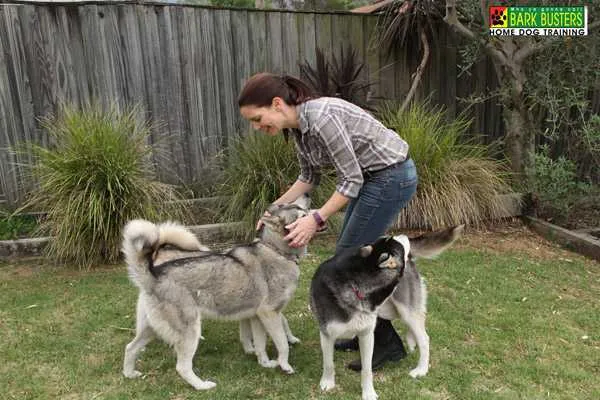What Is Holistic Dog Training

Bark Busters practices holistic dog training, but what does that mean? A holistic approach means that you take into consideration a number of different factors or systems when diagnosing and working on permanent solutions to dog behavioural issues. Holistic also means that the system is natural, with the Bark Busters system focusing on the natural way dogs communicate.
Bark Busters doesn't just look at the individual behaviours, but probe to get to the root of the behaviour. Often you can see the symptoms, but need a professional dog trainer to truly understand the causes. We train your dog based on the principles of love, respect and trust.
Some of the factors we consider are:
Physical: Is the dog healthy and getting enough good nutrition? Is it getting the right balance of physical exercise? Is the dog on any medications?
Environmental: Does the dog have adequate shelter, is the neighbourhood safe?
Emotional: Not only is the dog loved, but is its instinctive need for leadership being met? Does it trust the people it lives with and do they trust it?
Education: What sort of education has it had and how did it respond to training? Do the people continue practicing what was previously taught?
Experiences: Along with the education, what experiences has the dog had, has there been any trauma, or has it been overwhelmed at some time? How a dog reacts is a reflection of how it feels and its state of mind.
As you can see there can be a number of factors to consider which is why Bark Busters trainers are considered to be the experts when dealing with behavioural issues. Only when all of these factors are viewed, from the dog's perspective, can you find the real cause of behavioural issues and work up a plan to address WHY behaviour is occurring.
When you get to the root cause of the behaviours and deal with them, the what (behavioural symptoms) will take care of themselves. Dogs that feel good about their lives are calm and relaxed. They will typically sleep for up to sixteen hours a day or more. It doesn't mean they won't want to participate in your activities, but they aren't pushy, hyper, anxious or nervous.
Recent Articles
- How to Show Affection to Your Dog This Valentine’s Day
- Back to School Guide: Helping Your Dog Adjust to the New Routine
- How To Keep Your Dog Cool in the Summer Heat
- Keep Your Dog Safe This Summer: Bark Busters’ Essential Tips
- Christmas Dog Safety Tips: Keep Your Dog Safe & Happy This Festive Season
- Dog Training for Snake Safety: Essential Tips for Australian Pet Owners
- Dog Aggression Training & Tips
- Leash Training - How to Stop your Dog from Pulling on Walks
- Halloween Safety Tips for Dog Owners
- Understanding and Training Dogs with Separation Anxiety
